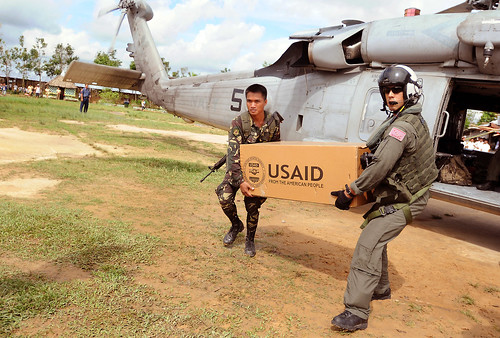
Humanitarian neutrality is dead. The sooner we stop mauling its rotting corpse, the better off we’ll all be. In fact, I don’t believe humanitarian neutrality ever existed. It’s not a corpse at all; it’s a figment of our imagination that we’re finally abandoned. The provision of humanitarian aid changes the dynamics of a conflict situation. It is therefore inherently not neutral, and it was naive to ever believe it could be.
Mary Anderson started talking about do no harm in 1994, and recognized that aid has an impact on the conflict, and is therefore never neutral. It was naive of us to ever pretend it was. Here’s what she had to say: “All aid programmes involve the transfer of resources (food, shelter, water, health care, training, etc.) into a resource-scarce environment. Where people are in conflict, these resources represent power and wealth and they become an element of the conflict.”
The targeting of NGO workers in places like Iraq, Afghanistan, and Somalia is appalling, and brutally dangerous. But what protected Medecins Sans Frontieres and the International Rescue Committee in Afghanistan in the 90s was not some airy-fairy belief in neutrality. It was the Taliban’s belief that the NGOs were not keeping the Taliban from achieving its goals. Combatants in Afghanistan no longer believe that, or are not organized enough to enforce rules. Mourning the end of neutrality is a dangerous sidetrack that keeps the real issue from being addressed.
All of that being said, I think that a particular NGO or project can nonetheless be known as honest and fair and therefore have a humanitarian space to operate in. But that’s not based on an abstract concept of neutrality or humanitarian space. It’s based on earning the trust and respect of local populations, and on convincing all sides of the conflict that your provision of aid will not turn the tables against them. That’s not an easy game to play, but it’s the only one we have. And, despite histrionics to the contrary, it’s the only game we’ve ever had.
——————————-
Chosen for pretty obvious reasons.

I think the noise about the loss of “humanitarian space” is not so much people complaining that there’s something being taken away from them as it is about something being imposed on them.
Militarization of aid is bad not because it encroaches on a “humanitarian space,” but because it establishes connection between aid groups and the military that may or may not actually be there. It exposes aid workers to unwarranted danger.
J, that’s a really good point.
In my opinion this is an excellent post. When you’re up to it, I’d love to see your thoughts on “Militarization of Aid”‘s nerdy younger brother: “Politicization of Aid.”
Hi. Long time, no internet (and a good break it was, too)
I’m not sure I agree with you on this. I think there were places and peoples who respected humanitarian operators. Maybe it was always contingent on place, politics and the particular agency – ICRC for example. But I think there was more space 10 years ago. When we first went to AFghanistan in 96, there was a respect for the work of NGOs (and there were only about 6 agencies there then anyway). That space is almost totally evaporated today.
I agree that there used to be respect for the work of NGOs, but I think it was respect for particular organizations and projects, not a broader belief in NGOs. You were there, though, and not me. Ten years ago I was in Iowa learning Uzbek, nowhere near a conflict zone.
The term that we would better use is not ‘respect’, as the matter is not a ‘lack of respect’.
If the ‘respect’ was bigger 10 years ago, it’s because there was a condition where people werent’ conciously of the role NGO’s play in a conflit. We should ever remeber that a conflit is place where radical political positions are unable to coexist. And if the Taliba, in their political interpretation of the situation, relates NGO’s to western governments, they’ll shoot their workers.
There is no such thing as neutrality. Every organization has a role on the conflict. And theirs workers should be very aware of it.